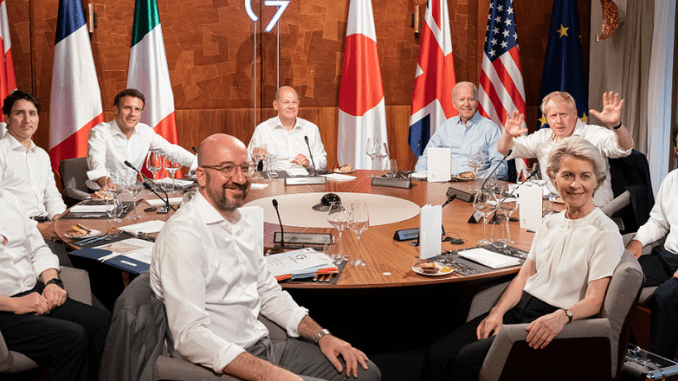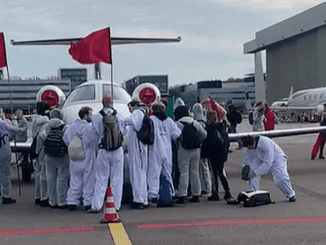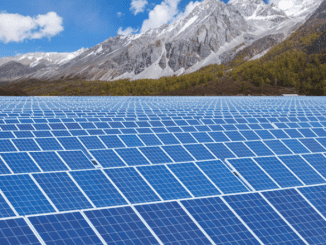
SCHLOSS ELMAU, Bavaria, Germany, June 26, 2022 (ENS) – At a century-old luxury resort in a Bavarian Alpine nature reserve, the world’s seven largest and wealthiest liberal democracies today formally launched the Partnership for Global Infrastructure to mobilize “hundreds of billions of dollars” to support climate action and improve cybersecurity, gender equality and health care.
Known as the Group of Seven, the G7 countries are: Canada, France, Germany, Italy, Japan, the United Kingdom and the United States; their leaders are meeting with the leaders of the European Union.
Germany holds the presidency of the G7 in 2022. The German Presidency says the G7 of 2022 “will work to protect the climate, the environment and biodiversity and to accelerate the global energy transition.”
In their meeting ahead of the G7 Leaders’ Summit today, Chancellor Olaf Scholz of Germany and U.S. President Joe Biden said the G7 meeting, which wraps on June 28, will coordinate responses to Russia’s further invasion of Ukraine, climate, and economic and democratic resilience.
President Biden announced the U.S. aims to mobilize $200 billion for the infrastructure partnership over the next five years through grants, federal financing, and leveraging private sector investments.
“Together with G7 partners, we aim to mobilize $600 billion by 2027 in global infrastructure investments. And this will only be the beginning. The United States and its G7 partners will seek to mobilize additional capital from other like-minded partners, multilateral development banks, development finance institutions, sovereign wealth funds, and more,” he said.
Biden explained that the partnership would be executed across “four priority pillars that will define the second half of the 21st century.”
The first pillar is climate stabilization, defined by the White House as, “Tackling the climate crisis and bolstering global energy security through investments in climate resilient infrastructure, transformational energy technologies, and developing clean energy supply chains across the full integrated lifecycle, from the responsible mining of metals and critical minerals; to low-emissions transportation and hard infrastructure; to investing in new global refining, processing, and battery manufacturing sites; to deploying proven, as well as innovative, scalable technologies in places that do not yet have access to clean energy.”
The second pillar is cybersecurity – developing, expanding, and deploying secure information and communications technology.
The third pillar is advancing gender equality with improved childcare, water and sanitation infrastructure, and fourth is upgrading the infrastructure of health systems and contributing to global health security through investments in patient-centered health services and the workforce; vaccine and other essential medical product manufacturing; as well as disease surveillance, early warning systems, safe and secure labs.
Both UK Prime Minister Boris Johnson and Canada’s Prime Minister Justin Trudeau stressed the need to direct the G7’s “substantial resources towards helping developing countries grow in a green and sustainable way.”
Protesters Make their Views Heard
About 4,000 protesters rallied in Munich, Germany on Saturday. Organizers had hoped to mobilize up to 20,000 protesters there and were disappointed by the low turnout at Munich’s Theresienwiese park, German news agency dpa reports.
Meanwhile, several hundred protesters marched Sunday in the southern German town of Garmisch-Partenkirchen, near where the G7 leaders are meeting, demanding action on climate change. Billions of dollars for climate infrastructure are already in the pipeline.
Climate Infrastructure on the Drawing Board
A few of the projects in the works under the new Partnership for Global Infrastructure, GPII, not to be confused with a different organization named Global Infrastructure Partners, are:
- U.S. firm AfricaGlobal Schaffer of Washington, DC, in collaboration with U.S. project developer Sun Africa of Miami, Florida, signed a contract with the Government of Angola to develop a US$2 billion solar project in four southern Angola provinces. The project will include solar mini-grids, solar cabins with telecommunications capabilities, and home power kits. In addition to supporting up to $1.3 million in U.S. exports, the project will help Angola meet its climate commitments, including generating 70 percent carbon-free power by 2025. Financial support comes from the U.S. Department of Commerce and the Export-Import Bank of the United States.
- USAID will invest $40 million in the Southeast Asia’s Smart Power Program to decarbonize and strengthen the region’s power system by increasing regional energy trade, accelerating the deployment of clean energy technologies, and engaging private sector leaders and key development partners in shared priorities. The program is expected to mobilize $2 billion in financing as a result of U.S. Government assistance, increase regional energy trade by five percent, and result in two gigawatts of advanced energy systems deployed.
- The U.S. International Development Finance Corporation, DFC, will invest up to $30 million in Omnivore Agritech and Climate Sustainability Fund 3, an impact venture capital fund that invests in entrepreneurs building the future of agriculture, food systems, climate, and the rural economy in India. The Fund is targeting a $65 million first close in September and a final close in 2023 to reach its target capitalization of $130 million. Through this investment, DFC expects to mobilize $30 million in private capital.
- The U.S. Government with U.S. firm NuScale Power of Tigard, Oregon will provide $14 million in support for the Front-End Engineering and Design study for Romania’s deployment of a first-of-its-kind small modular nuclear reactor power plant. Building on U.S. Government efforts, including advocacy support from the Department of Commerce and technical assistance from the State Department and U.S. Trade and Development Agency, this investment is meant to mobilize a multi-billion-dollar effort and showcase U.S. ingenuity in the advanced nuclear sector, accelerate the clean energy transition, create thousands of jobs, and strengthen European energy security while upholding the highest standards for nuclear safety, security, and nonproliferation.
Germany Promotes a ‘Climate Club’
Through its G7 Presidency, Germany is initiating the establishment of an open, cooperative “climate club,” a formal alliance to harmonize reduction of carbon emissions, which could accelerate decarbonization and promote sustainable development of energy efficient businesses.
The concept advanced on May 20, when the G7 finance ministers and central bank governors released a communique stating their intent to explore a “climate club.”
The primary goal of the German climate club proposal is to accelerate the implementation of the Paris Agreement by persuading G7 members to:
- Agree on uniform standards for the pricing of the greenhouse gas carbon dioxide
- Agree on common measures for supporting countries that implement ambitious climate protection measures
- Promote the transfer of knowledge and technology to non-G7 club members
- Support climate policy reform in non-G7 club member countries
- Accelerate the just, global transition towards sustainable and climate-neutral societies
- Enhance research on tackling climate change
- Align climate aspects with the UN Global Sustainable Development Goals and with security policy as it relates to climate change as a risk multiplier
From its base in Washington, DC, the Climate Leadership Council comments, “In the global market today, emissions associated with the production of internationally-traded goods go largely unpriced, giving an unfair advantage to the dirtiest, most unregulated economies. Trade policies that account for the carbon emissions embodied in goods would flip the incentives, rewarding producers who adopt cleaner practices.”
Featured image: G7 leaders in a working session. Clockwise from left: Italian Prime Minister Mario Draghi, Canadian Prime Minister Justin Trudeau, French President Emmanuel Macron, German Chancellor Olaf Scholtz, U.S. President Joe Biden, UK Prime Minister Boris Johnson, Japanese Prime Minister Fumio Kishida, European Commission President Ursula von der Leyen, and European Council President Charles Michel. Schloss Elmau, Bavaria, Germany, June 26, 2022 (Photo courtesy Government of Germany)
© 2022, Environment News Service. All rights reserved. Content may be quoted only with proper attribution and a direct link to the original article. Full reproduction is prohibited.



